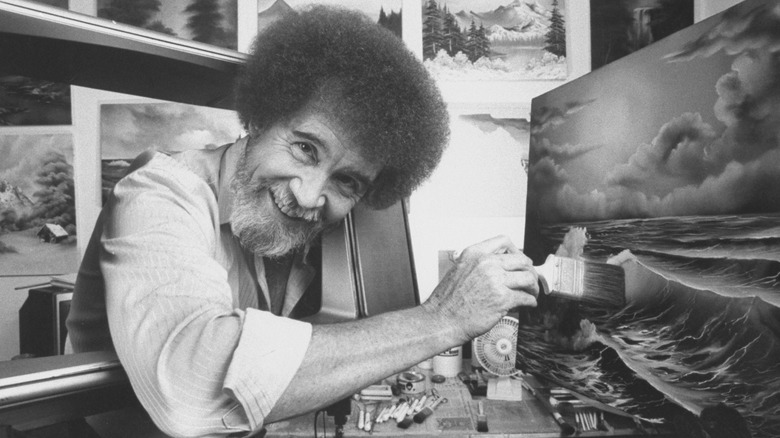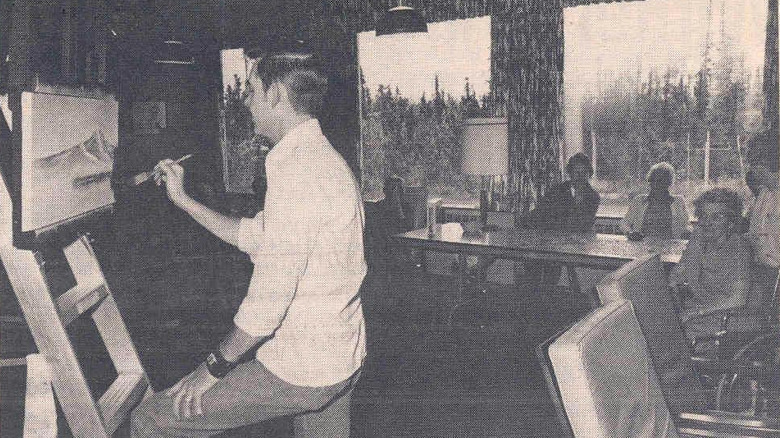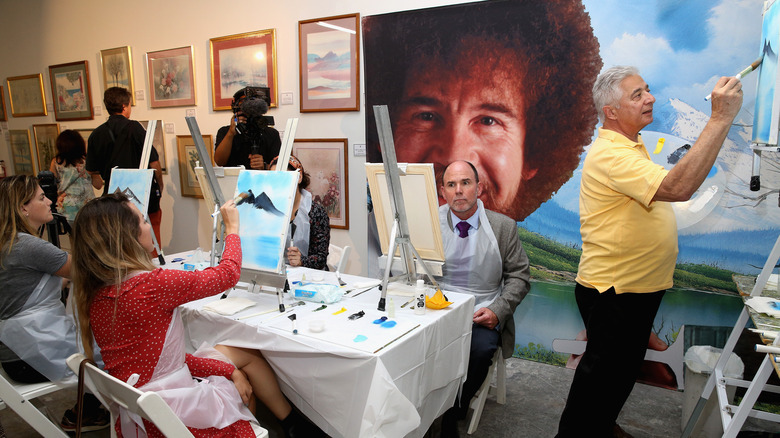Here's How Bob Ross Found His Calling To Be A Painter
Bob Ross and the original run of his PBS show, "The Joy of Painting" (1983 to 1994), left a singular impression on our cultural landscape that can never be duplicated. He taught by example in easy-to-understand steps, made art far less intimidating, invited rather than commanded, and did it all with the most calming, genial, blood pressure-reducing demeanor and happy little 'fro possible. But, if Ross hadn't been a sergeant in the Air Force we would have never gotten the privilege of his presence and tutelage.
Born Robert Norman Ross in 1942 in Daytona, Florida, Ross dropped out of school in the ninth grade and joined the Air Force in 1961. But as a tall man (6 foot, 2 inches) with flat feet and a partially severed left index finger, he wasn't cut out to fly in a cockpit. Rather, he started as a medical records technician and ended with the rank of first sergeant. As the Orlando Sentinel quoted him in 1990, and contrary to his later public persona, he "was the guy who makes you scrub the latrine, the guy who makes you make your bed, the guy who screams at you for being late to work. The job requires you to be a mean, tough person." He even earned the nickname, "Bust 'Em Up Bobby." He had to be so mean, in fact, that he swore when he left the military he'd be the nicest person around. Enter: Bob Ross the painter.
Ross' role as sergeant led him to painting
It's definitely strange to imagine Bob Ross barking orders at a new military recruit to scrub a toilet, but that's what it took to make Ross commit to a life of peace and happiness. That, plus Alaska's natural beauty, German painter William Alexander's "wet-on-wet" painting technique, and a side job working at a tavern.
Ross left his 20 years in the Air Force in 1981 vowing "never to scream again" as the Orlando Sentinel says. While in the military a happy set of circumstances led him to painting, starting with the Alaskan landscape, per Biography. Ross was particularly moved by Alaska's mountains and took a painting class through the United Service Organization (USO). And of course, we all know how much Ross loved painting landscapes on the "The Joy of Painting."
At the same time, Ross had a part-time gig working in a tavern through which he sold his work. As he told the Orlando Sentinel, he'd go home for lunch, do a couple of paintings, and bring them back to the tavern. Plus, he painted on tins used to pan for gold, which made for the perfect novelty purchase.
It's because Ross had to paint so quickly that he employed his "wet-on-wet" painting technique, i.e., not waiting for paint to dry. For this, he took inspiration from painter William "Bill" Alexander, whom Artsy says also had a PBS painting show of the same format as Ross', "The Magic of Oil Painting." Ross even borrowed Alexander's catchphrase, "happy little trees."
[Featured image by SrA Dan Saylor via Wikimedia Commons | Cropped and scaled]
Ross' legacy of happiness
Bob Ross finished his 20-year career in the Air Force in 1981, and within two years had already launched his beloved PBS show, "The Joy of Painting," in 1983. Driven to pursue what had brought him joy during his time in the military, Ross took some more painting classes to refine his technique. That included taking classes directly with the aforementioned William "Bill" Alexander and traveling with the painter's door-to-door paint supply sales company, Alexander Magic Art Supplies Company.
This decision gave Ross the next link in the chain to "The Joy of Painting," when he met Annette Kowalski at a five-day class at a hotel. Kowalski's son had recently died in a car accident, and she desperately wanted to go to Alexander's class to help heal. As NPR explains, she met Ross at the class and knew she'd seen something special. "I was so mesmerized by Bob," she said. "Somehow, he lifted me up out of that depression." She's the one who suggested leveraging Ross' natural disposition and skill into a career. She also became his manager.
Fast forward to the present and all of Ross' 400-plus "The Joy of Painting" episodes are freely available to watch online. Ross died in 1995 from lymphoma at 52, but his legacy is cemented, along with all the titanium white and fan brushes you could ask for. And if Ross had not been required to be loud and harsh in his role as Air Force sergeant, none of it likely would have happened.


